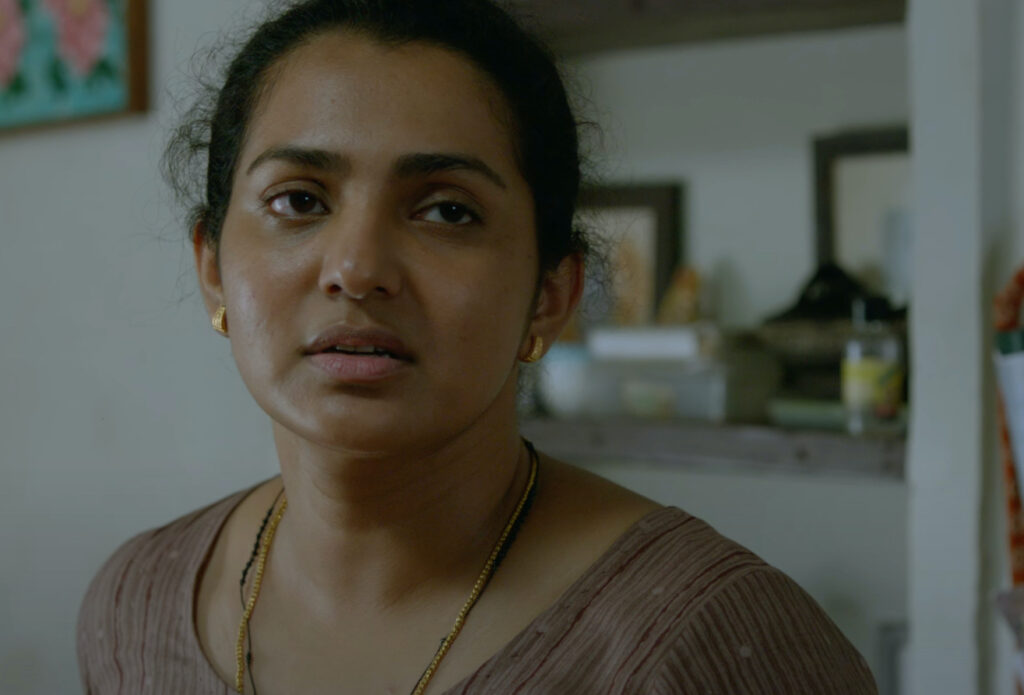Ullozhukku (Undercurrent), Christo Tomy’s debut feature film made in Malayalam, explores a moral crisis concerning a woman and her mother-in-law. The film, sans a simplistic black-and-white treatment, is an astutely observed portrait of how some of our choices in life can have unforeseen and lifelong repercussions for us and those around us.
Anju (Parvathy Thiruvothu) is married to Thomaskutty (Prasant Murali), who lives with his mother, Leelamma (Urvashi), in a small town in Kerala. Thomaskutty has been diagnosed with a brain tumor and is undergoing treatment for the same. During one of his routine visits to the hospital along with his mother and wife, Anju comes across her old flame, Rajeev (Arjun Radhakrishnan). Both of them rekindle their romantic relationship clandestinely as they rediscover the deep affection they once shared. As the affair progresses, Anju discovers that she is pregnant with Rajeev’s child even as Thomaskutty suffers an accident at home and is rushed to the hospital in critical condition. Leelamma discovers that Anju is expecting and naturally assumes that Thomaskutty is the father…
Secrets, lies and deceit within a family always provide rich material for a film because its characters come packed with history, uncomfortable truths, conflict and unspoken feelings about each other. With these assets in hand, Tomy crafts Ullozhukku as an extremely engaging drama told perceptively with sharp, economic storytelling. The film develops its story steadily as it introduces us to each character and allows us to learn about their lives before introducing the film’s major conflict. As the narrative progresses, it reveals the stark contrast between outward appearances and underlying truths. Tomy’s screenplay, crafted with disarming simplicity, delves into deeper psychological depths thereby enhancing our investment with the two women at the center of it all. As they put their till-now-cordial relationships on the line, they pass on the baton of blame to-and-fro among themselves only to aggravate matters further. Credibly, Tomy avoids any overt dramatic embellishments as he builds up the degree of dissent between Anju and Leelamma step-by-step. He restricts the conflict to unfold strictly within the confined space of the house, which forces them to acknowledge the others presence continuously within the incessant pummelling of the rigors of daily life.The floodwater entering the compound of the house symbolizes how the characters negotiate their way living in a reality that is now eroding.
As Tomy develops the story one layer at a time, Ullozhukku details how various family members are the causes of Anju and Leelamma’s troubles. These revelations serve as turning points and allow Anju and Leelamma to gradually find a deeper understanding of themselves and their place within the family dynamic. The film points out that a relationship founded on concealment is destined to crumble, shattering the lives of those involved. As humans, we can either succumb to this or rebuild our lives anew. That’s just how the film is as it draws us closer to its flawed characters and makes us realize the discontent of travelling through life with hopeful resignation. Just like the final image of the film.
Ullozhukku rests completely on the shoulders of its two leading actresses. Parvathy plays Anju with superb placidity, savouring the quiet, thoughtful, and melancholic beats of the film. Urvashi plays off her perfectly as she embraces Leelamma’s contradictions and yet humanizes her flaws and complexities. Arjun Radhakrishnan delivers a nicely nuanced performance though in the climax, his character lacks the much-needed buildup thereby resulting in a rather rushed ending – a major flaw in the otherwise smooth flow of events. The supporting cast is fine and understated in their roles.
With keen attention to minute details, the balanced cinematography by Shehnad Jalal reveals rich details about the characters’ personalities and quirks. Kiran Das’ has edited the film with an unhurried and languid pace that works effectively to transport us into the world of the film. Jayadevan Chakkadath and Anil Radhakrishnan’s sound design sensitively maintains the film’s nuanced and emotional atmosphere while the background score by Sushin Shyam is unflashy and restrained, becoming an integral part of the emotional journey of the two characters.
Tomy has crafted a compelling and quietly riveting drama with enormous sympathy and flair, sidestepping mawkishness at every turn to deliver an empathetic tale about how families learn to persevere during the toughest of times. It is heartbreaking and heartwarming in equal measure and is anchored by splendid performances. It is a fine debut making him a filmmaker to look out for in the future.
Malayalam, Drama, Color


